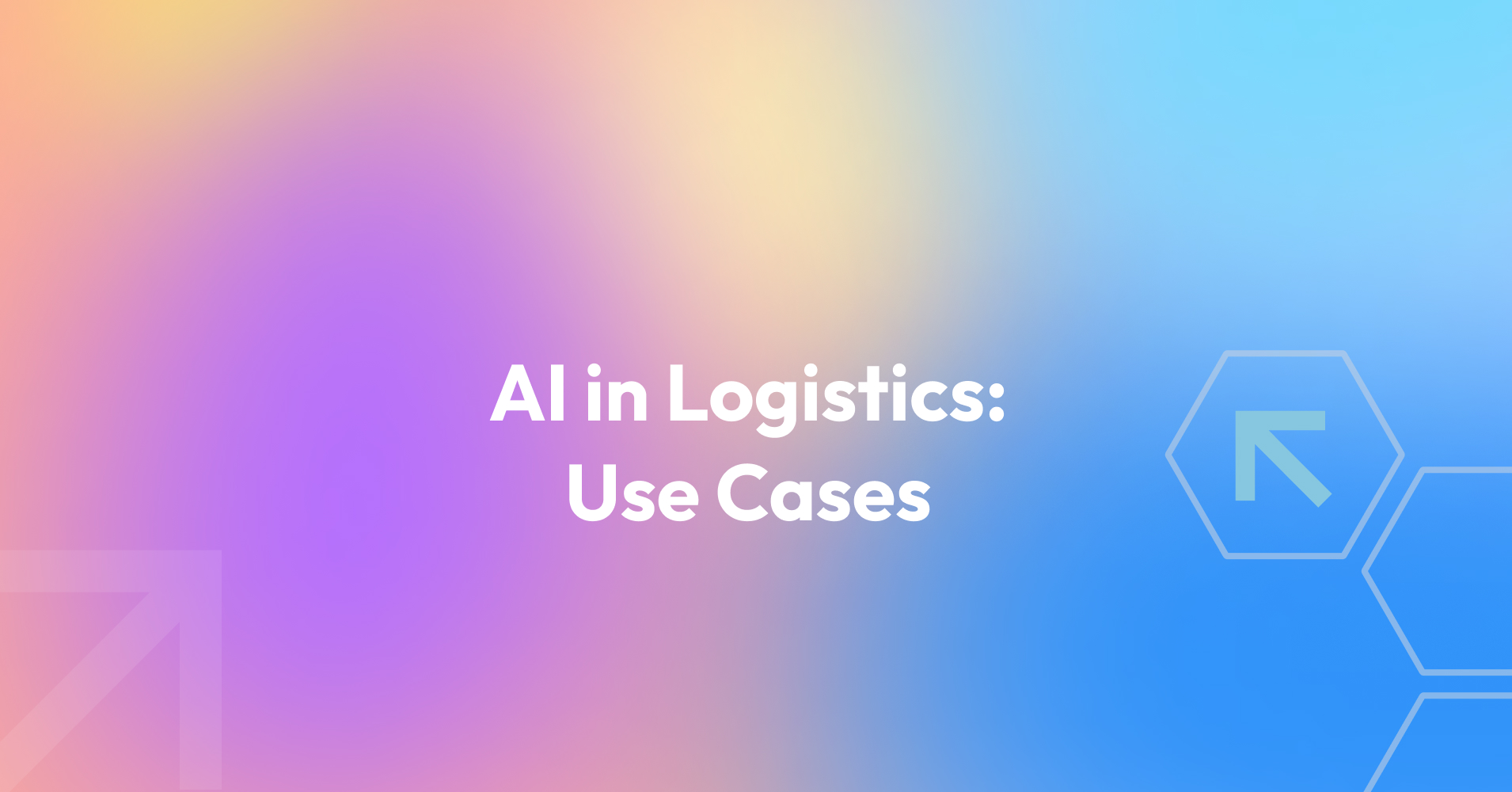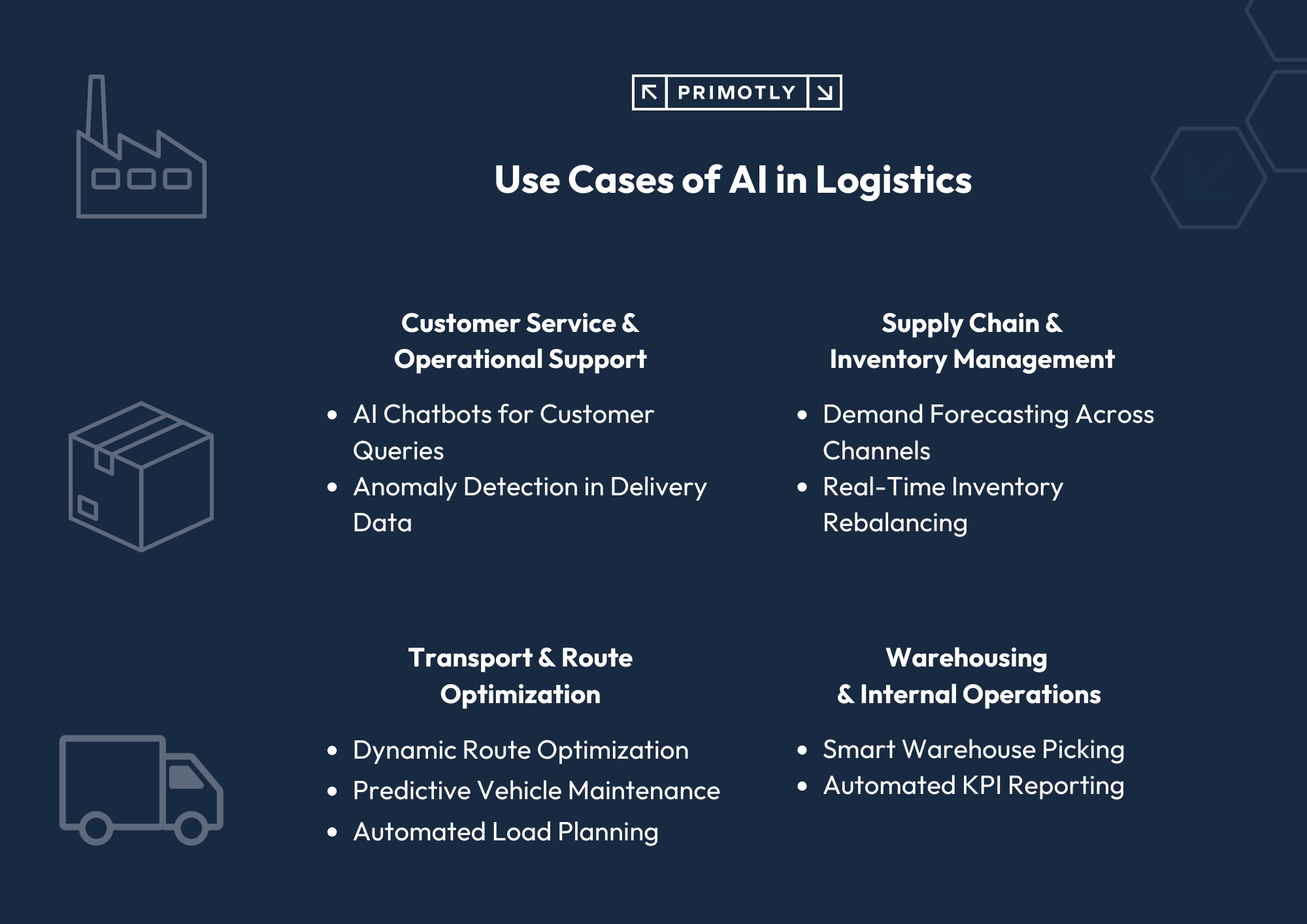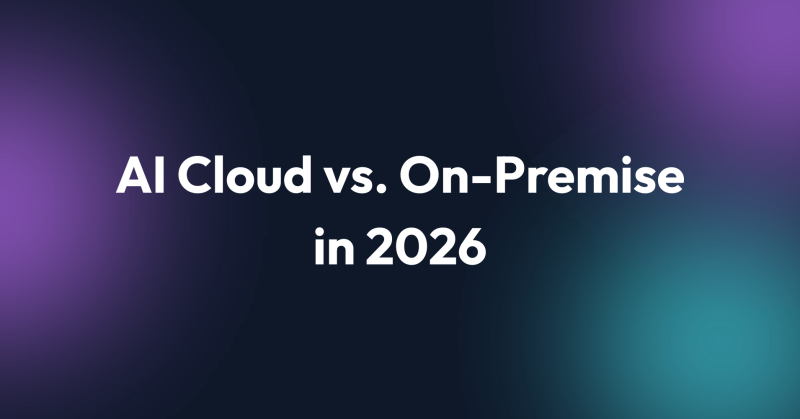Logistics companies have to deal not only with rising fuel prices, but also with both global and local supply chain disruptions, increasingly complex warehouse management, and growing customer expectations for speed and transparency. Taking care of everything manually seems almost impossible, especially if you’re operating at a large scale.

The good news? Artificial intelligence is a real, practical toolkit that’s already transforming how supply chains run - from the warehouse floor to last-mile delivery.
In this article, we take a closer look at 10 ways logistics companies are using AI today - not in theory, but in practice. We focus on practical examples, without going into technological details.
Whether you're curious about automation, demand forecasting, or smarter customer service, there's something here to spark ideas.

Transport & Route Optimization
One of the most visible ways to use AI in logistics is through smart transportation. AI systems are enabling real-time route optimization by analyzing factors like traffic conditions, weather patterns, delivery priorities, and fuel efficiency.
Dynamic Route Optimization
AI processes live traffic, weather, and delivery conditions to continuously suggest the fastest, most efficient delivery paths.
Predictive Vehicle Maintenance
Machine learning models detect mechanical issues in advance by monitoring sensor data from trucks and delivery vehicles, helping avoid costly breakdowns.
Automated Load Planning
AI calculates the most efficient way to pack shipments based on size, weight, and delivery priority — maximizing space and minimizing fuel usage.
Warehousing & Internal Operations
Inside the warehouse, AI technology is powering automation and operational intelligence. Robotics paired with AI is transforming order picking, sorting, and inventory scanning - increasing speed and accuracy.
Smart Warehouse Picking
AI-powered robots and vision systems optimize pick routes, reducing time and human error in order fulfillment.
Automated KPI Reporting
AI tools compile warehouse efficiency metrics (like pick accuracy, turnaround time, or throughput) and deliver real-time performance dashboards.
Supply Chain & Inventory Management
Effective inventory management is the backbone of any supply chain. This is where AI in supply chains really shines.
Real-Time Inventory Rebalancing
AI predicts inventory shortages or surpluses across multiple locations and recommends optimal stock transfers to avoid waste or delays.
Demand Forecasting Across Channels
By analyzing sales trends, seasonality, and external data (like weather), AI helps forecast demand more accurately and align logistics planning.
In short, AI can help turn reactive logistics into proactive, strategic supply chain management.
Customer Service & Operational Support
AI use cases in logistics aren’t limited to hardware and forecasting — they also apply to the human side of operations.
AI Chatbots for Customer Queries
Automated assistants can handle FAQs about delivery status, estimated arrival, or returns, improving response time and freeing up human support teams.
Anomaly Detection in Delivery Data
AI monitors shipment data in real-time and flags delays, irregular temperature drops, or unexpected route deviations, allowing teams to act fast
For logistics companies handling high volumes of interactions, these AI applications free up teams to focus on more complex, high-value tasks.
Sustainability & ESG
As regulations tighten and customers demand greener practices, AI in logistics is playing a growing role in environmental strategy.
CO₂ Emission Tracking and Optimization
AI calculates emissions per route or shipment and suggests greener alternatives — a powerful tool for logistics companies aiming to meet ESG and CSRD requirements.
Final Thoughts: Why Use AI in Logistics?
The logistics industry is evolving fast. Whether you’re focused on transportation, inventory management, or sustainability, AI solutions are unlocking new levels of visibility, control, and cost savings.
The key is to use AI not as a one-size-fits-all technology, but as a set of tools tailored to your company’s goals. From predictive maintenance to warehouse robotics and supply chain optimization, AI tools are no longer optional — they’re essential.
If your company is exploring the possibilities of implementing AI across logistics operations, now is the time to move from pilot to strategy.
FAQ
What are the key AI use cases in logistics and transportation?
There are several key AI use cases in logistics and transportation that significantly enhance efficiency and effectiveness.
These include predictive analytics for demand forecasting, route optimization for transportation, automated inventory management, real-time tracking and monitoring of shipments, and the use of AI algorithms to improve customer service through chatbots and virtual assistants.
Each of these AI applications leverages artificial intelligence to streamline logistics operations and enhance overall performance.
How does AI in logistics improve inventory management?
AI in logistics plays a crucial role in enhancing inventory management. By utilizing AI solutions, companies can analyze historical data and predict future demand more accurately.
This allows for better stock level management, reducing excess inventory and minimizing stockouts. AI systems can also automate reordering processes, ensuring that products are replenished in a timely manner, thus optimizing logistics operations and improving supply chain efficiency.
What are the benefits of implementing AI technology in the logistics industry?
The benefits of implementing AI technology in the logistics industry are manifold. Firstly, it enhances operational efficiency by automating routine tasks, thereby reducing human error.
Secondly, AI can help in cost reduction through optimized routing and better resource allocation.
Thirdly, it improves customer satisfaction by providing real-time updates and personalized services. Overall, the benefits of AI in logistics lead to increased competitiveness and profitability for logistics companies.
Can you explain how AI algorithms are used for route optimization?
AI algorithms are pivotal in route optimization within the transportation sector. These algorithms analyze various factors such as traffic patterns, weather conditions, and delivery schedules to determine the most efficient routes for vehicles.
By using historical data and real-time information, AI in transportation and logistics can significantly reduce delivery times and fuel costs, leading to more efficient logistics operations and enhanced customer satisfaction.





















